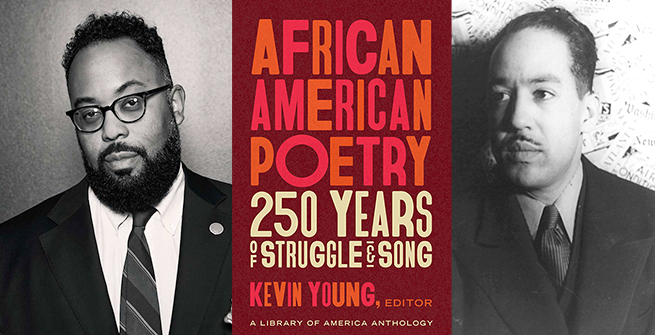African American History Month begins today; on February 1 we also celebrate the birthday of Langston Hughes, one of the most powerful voices in American poetry.
Both Langston Hughes and Kevin Young, also an acclaimed poet as well as incoming director of the National Museum of African American History and Culture, grew up in towns around the Midwest and spent formative years in Kansas. For this and other reasons including their shared love of jazz, Young feels an affinity for Hughes, and writes about him in To Repel Ghosts: Five Sides in B Minor and in Brown, a poetic reflection on his Midwest childhood. Young recently edited the landmark anthology African American Poetry: 250 Years of Struggle and Song, which definitively presents its full, dazzling scope and illuminates its centrality to American literature. As Young writes in the introduction:
“For more than 250 years, African Americans have written and recited and published poetry about beauty and injustice, music and muses, Africa and America, freedoms and foodways, Harlem and history, funk and opera, boredom and longing, jazz and joy. They wrote about what they saw around them and also what they dreamed up—even if it was a dream deferred, derailed or flat-out denied. In sonnets and anthems, odes and epics, Black poets in the Americas confronted violence and indifference, legal barriers to reading and writing, illegal suppression of voting rights, and outright threats to their personhood, livelihood, and neighborhoods…For American Americans, the very act of composing poetry proves a form of protest.”
Langston Hughes learned early that language can transcend suffering; in his 1940 autobiography The Big Sea he recalled that “books began to happen to me, and I began to believe in nothing but books and the wonderful world in books—where if people suffered, they suffered in beautiful language, not in monosyllables, as we did in Kansas.” He also believed in taking pride in African American culture and the Black aesthetic, finding struggle, laughter, and joy in all its walks of life. Hughes helped kindle a positive consciousness of African heritage. One of his first published poems is still one of his best-known, and helped kickstart the Harlem Renaissance: “The Negro Speaks of Rivers”, in which Hughes asserts a personal connection to the legendary rivers of Africa:
I’ve known rivers:
I’ve known rivers ancient as the world and older than the flow of human blood in human veins.
My soul has grown deep like the rivers.
I bathed in the Euphrates when dawns were young.
I built my hut near the Congo and it lulled me to sleep.
I looked upon the Nile and raised the pyramids above it.
I heard the singing of the Mississippi when Abe Lincoln went down to New Orleans, and I’ve seen its muddy bosom turn all golden in the sunset.
I’ve known rivers:
Ancient, dusky rivers.
My soul has grown deep like the rivers.
Hughes saw his poetry as sharing the spirit of jazz, as Rebecca Gross explains in a post on the National Endowment for the Arts website, where you can also enjoy a clip of Hughes performing “Weary Blues” accompanied by a jazz band for Canadian television in 1958: “the poet considered jazz and the blues to be uniquely African-American art forms, both of which spurned the desire for assimilation and acceptance by white culture, and instead rejoiced in black heritage and creativity. Rather than wish away daily hardship, the blues instead elevated the troubles of the workaday African American into art.” In 1955 he wrote a wonderful book for children called The First Book of Jazz that is still in print. Hughes died in 1967, an eloquent voice whose inspiration traveled the world.
African American Poetry: 250 Years of Struggle and Song was celebrated last week at Lift Every Voice, an online event hosted by the Library Foundation of Los Angeles. As Kevin Young points out in his introduction, the relevance of African American poetry only increases as the list of prominent poets grows, now including Pulitzer Prize-winners Tyehimba Jess, Gregory Pardlo and Jericho Brown, as well as Poets Laureate Robert Hayden, Gwendolyn Brooks, Rita Dove, Natasha Trethewey, and Tracy K. Smith. Young was joined at last week’s event by our first-ever National Youth Poet Laureate, Amanda Gorman, whose electrifying presentation of “The Hill We Climb” at the recent inauguration was truly a watershed moment for a nation desperate to heal from a multitude of crises.
Young concludes with a powerful invocation of the inseparability of poetry and life:
“African American Poetry has long borne witness to and sustained social change; our time, with growing protests over the pandemic of racist violence against the unarmed, the young, the trans, the sleeping, the walking, the jogging—all those who have the audacity to breathe while Black—has only given Black poetry, intimate with struggle, more urgency to sing of. The African American experience, these poets know, is a central part of the nation’s chorus, with Black poetry offering up a daily epic of struggle and song.”
Read more about Langston Hughes at The African American Experience, a database accessible with your library card and pin, and enjoy books from his oeuvre including poetry collections, plays, novels, and nonfiction.

